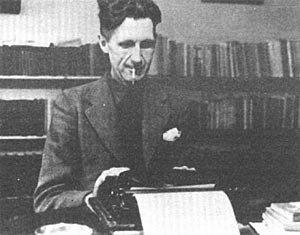 If Orwell were still alive, I think he'd write the same thing about Islam:
If Orwell were still alive, I think he'd write the same thing about Islam:Restating the Obvious about Islam April 3, 2006 by Herbert I. London
With war clouds on the horizon in the 1930’s and policy analysis in thralldom to a form of denial, George Orwell said, “things have sunk so low that the first duty of intelligent men is the restatement of the obvious.”
In our own time there is a reluctance to consider the true and emerging nature of Islam, what the faith teaches and its doctrines. For tactical reasons, many politicians in the West call Islam a religion of peace; some say it is a religion hijacked by extremists and others maintain that Sufis (a small minority sect) represent the true nature of Islamic pacifism.
Very recently, however, MEMRI reports that an Islamic scholar Dr. Kamel Al-Najjar challenged these suppositions by restating the obvious: intellectuals, who call for a condemnation of violence among Moslems and an openness in Islam, do not understand the history of this religion.
According to Dr. Al-Najjar, Islam was tolerant during only one brief period in its history. Islam was humane and tolerant when it was relatively weak, during the so-called Mecca period. Later Koranic verses call on Muslims to fight anyone who does not convert to Islam: “And kill them wherever you find them, and drive them out from whence they drove you out.” The “verse of the sword” and other warlike verses were said to abrogate tolerant verses of the Mecca period.
The Second Caliph imposed his well known contract on Christians which forced them to cut their hair and wear special garments so that they would be recognizable, and forbade them to ring church bells.
Al-Najjar also notes that violence is rooted in Islam from inception. A child should be beaten if he doesn’t pray and a woman should be beaten if she disobeys her husband. Fatwas are routinely issued against those who criticize any form of the religion. And apostasy, as events in Afghanistan suggest, is a crime punishable by death. By the way this Sharia code has been adopted in 14 Muslim nations.
How then can Judeo-Christian societies co-exist with Islam when Christians are described a polytheists for their worship of the Trinity and Jews are portrayed as descendants of apes and pigs? The hostility engendered by claims the Bible and New Testament are falsified is not easily overcome.
Surely the West should attempt to discover the radiant face of Islam, but it can do so only with realism, facing harsh facts and understanding a history that has been ignored or misunderstood.
he emerging clash of cultures has to be considered without a white wash of Islamic history. Winston Churchill who fought against the Mohammedans recognized the extremism endemic to the religion. The rivers of the Sudan and Asia Minor turned red from the blood let by Islamic violence. It doesn’t make sense to ignore this past.
This description does not presuppose a strategy. I do not know how this religious force let loose on the world stage can be moderated. However, I do know the first condition for strategic planning is an unvarnished view of the truth, what Orwell called the restatement of the obvious.
On this score, we should not suffer from illusions. Islam is not comparable to other religions; it is distinctly uneasy with modernity. Islam has not had an Enlightenment. As a consequence, politics and religion are not separate entities. Sharia holds for both. Islam does not provide for individual rights; there are only group rights. And Islam is totalistic in the sense it pervades every aspect of one’s life.
This leads to several poignant questions: Can Islam adapt to the 21 century without violence? Can Islamic leaders find precepts in the Mecca period that can predominate and reduce the extremist impulse? Can the young be reeducated to accept the views of other religions?
The world jury awaits answers. In fact, the fate of the globe may hang in the balance of these answers. At the moment, however, it is best in my judgment, to consider conditions as they are rather than how we might like them to be. Herbert London is president of Hudson Institute and professor emeritus of New York University. He is the author of Decade of Denial (Lanham, Maryland: Lexington Books, 2001).
London maintains a website.
Link to article:
The intellectuals are finall, "getting it."

No comments:
Post a Comment